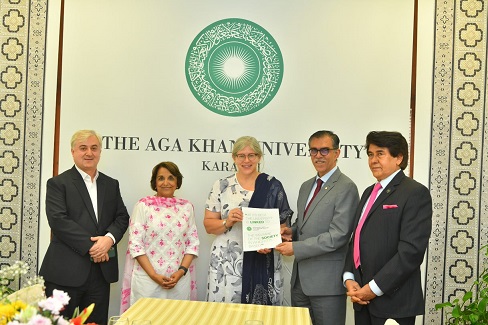Integration of family planning in maternal and child health to boost reproductive health

Canada’s High Commissioner to Pakistan Wendy Gilmour receives a copy of 'The Economic Impact of the Aga Khan University in Pakistan' from AKU President Dr Sulaiman Shahabuddin
The project is partnered with UNFPA, Sindh Govt, AKF and AKU, and funded by Government of Canada.
Karachi, June 20, 2022: Population growth is a cross-sectoral issue that impacts all aspects of life, including economy, education, health and environment. Pakistan has the modern contraceptive prevalence rate of 25 per cent, which is one of the lowest in South Asia.
Lack of access to such services is a major driver of maternal mortality, poor health and exclusion for women and girls.
These were the views by experts from the Aga Khan University’s Institute for Global Health and Development, who are part of Sihat Mand Khandan: Healthy Families for Pakistan Through Accelerated Sexual Reproductive Health and Family Planning Services, a project partnered with the United Nations Population Fund, Government of Sindh, Aga Khan Foundation, and Aga Khan University.
Funded by the Government of Canada, the five-year project is exploring how to improve sexual and reproductive health, and family planning within the existing service delivery platforms in the public sector in Pakistan.
Swiss Ambassador to Pakistan visits AKU
It involves enhancing awareness about family planning, provision of quality family planning counselling and services, and the capacity building of public health care providers at health care facilities and Lady Health Workers, in the selected districts of Sindh, Khyber Pakhtunkhwa and Gilgit-Baltistan.
Canada’s High Commissioner to Pakistan Wendy Gilmour, UNFPA Pakistan Representative Bakhtior Kadirov, Sindh Director General, Health Dr Juman Bahoto, AKF Pakistan CEO Akhtar Iqbal, and Director Projects of AKU’s Centre of Excellence in Women and Child Health Dr Zahid Memon visited the intervention sites in Matiari district, Sindh.
Based on the learning and impact of the project after its completion in 2024, the interventions will be scaled up to other areas in the country.
The delegation also visited AKU’s Mother and Child Health Research and Training Centre in Matiari. The 11,000-square-foot facility houses a research laboratory with BSL 1 and 2 facilities, training spaces, data centres, and office and administration spaces.
“We were very pleased to see the public-private partnership in action with better health care and facilities, and training to health care providers,” commented the Canadian High Commissioner Ms Gilmour.
Earlier, the delegation met with the Sindh Minister of Health and Population Welfare Dr Azra Pechuho to discuss pathways for delivering accelerated reproductive health and family planning, noting progressive policies adopted by the Government of Sindh.
“Sindh Government is making efforts to enhance the family planning and reproductive health services in the province. We aim to achieve 57 per cent contraceptive prevalence rate by 2030,” said Dr Pechuho.
The delegation also met with the Sindh Minister for Women Development Syeda Shehla Raza and the Home Department Secretariat, and discussed welcome efforts by the Sindh Government to ensure multi-sectoral approaches to address issues like gender-based violence and child marriage.
“Pakistan needs institutions like AKU, which is a role model for health care and academic excellence,” said Ms Gilmour while talking to AKU President Dr Sulaiman Shahabuddin after she returned to Karachi.
Dr Shahabuddin lauded all stakeholders for being part of an important initiative to strengthen the quality of maternal health and family planning services.
“AKU’s mission is to improve the quality of life in the developing world and beyond, through world-class teaching, relevant research, and quality health care for all,” he said.





